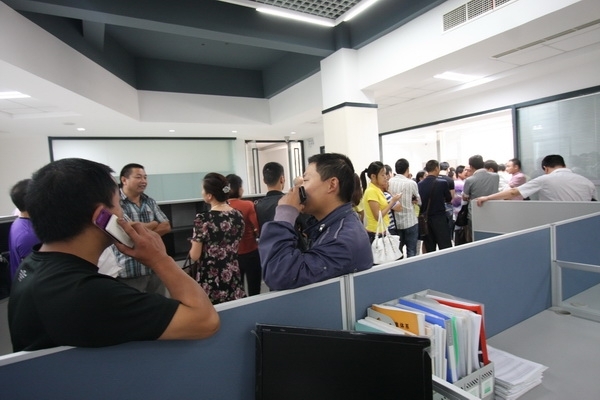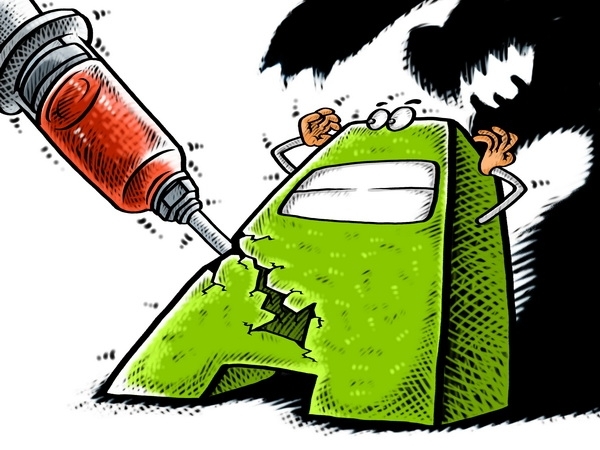

The New Focus of Organization Department
News, page 2
~ “Officials from the [Communist Party’s] Organization Department often have economic and business roles these days,” the head of one venture capital firm told the EO.
~ With the focus on its “specialists project”, the organization department is now getting more involved in areas such as technology and investment. Dong Lianxiang, a professor at the communist party school in Jiangsu province suggested that the “Organization Department should get more involved in the economy and adapt to the economic development.”
~In the middle of Sep, 2011, the Organization Department of the CPC Central Committee held the “Taihu Summit on the project for the thousands of specialists” in Jiangsu. The “project for thousands of specialists” was launched in December 2008 to attract overseas experts to establish business in China. The project has been overseen by the Organization Department, whose responsibilities have grown beyond the traditional focus on cadres and organization.
~ The Organization Department often appears to be the “mysterious department,” but is now trying to be more open and transparent, officials say. It has added a public relations department, and it has adapted a newspaper - the Organization and Personnel newspaper - to serve as its mouthpiece.
Original article: [Chinese]

Wenzhou Private Enterprises Owners Run Away
Nation, page 9
~One week before the National Day, the boss of Zhejiang Xintai Group, a well-know maker of spectacles in Wenzhou, run away because his business was insolvent.
~Since March, more than 80 private-owned enterprises have seen bosses abscond, bankruptcy or complaints from unpaid salaries.
~If the crisis expands, then 40% of private-owned enterprises in Wenzhou could be closed down by the end of this year, according to Zhou Dewen, the Chairman of Wenzhou Development Promotion Association for Small and Medium-sized Enterprises (SMEs).
~Wenzhou is only a miniature of the crisis of the private lending market, the financial grey zone, across the country. Under the background of tight monetary policy, Jiangsu, Fujian, Henan and Inner Mongolia and other provinces and regions have become zones of high-risk zone private lending.
~The legalization of private financing and the inclusion of private lending into the mainstream loan system is the key to avoiding a “Chinese style credit crisis”, most industry insiders interviewed by the EO believed.
~Increasing wages and raw material costs, the appreciation of the yuan, heavy tax and other negative factors have made it hard from SMEs to survive, while tight monetary policy has also closed access to many bank credits.
~After the financial crisis in 2008, monetary policy was loosened, “At that time, most enterprises were over optimistic, after borrowing money from the bank, they invested in upgrading technology and expanding their businesses, one or two years later, when all the construction of basic infrastructure was completed and they needed money for production monetary policy had tightened,” aaid Zou Jianqiang the Deputy Director of Wenzhou Industrial Park Zone Administrative Committee Office.
~According to data from the Commission of Economy and Information Technology, close to 60% of private enterprises in Wenzhou guarantee financing for other enterprises. Therefore, if the credit crisis gets out of control, a series of chain reactions will cause a surge in bad loans and redundancies.
Original article: [Chinese]

China's Richest Man Tipped to Join Central Committee of CPC
Nation, page 13
~ Crowned "China's Richest Man" in 2011 by the influential Hurun rankings, the co-founder and Chairman of Sany Heavy Industry Liang Wengen (梁穩(wěn)根), is estimated to have amassed a personal fortune of around 70 billion yuan.
~ Media reports in Sep claimed that Liang is being considered as a candidate to become a member of the 18th National Congress of the Communist Party, noting that he had passed a political examination by the CPC's organization department.
~ The fact that a private entreprenuer of Liang's standing might soon embark on a politcal career has attracted a lot of attention domestically. If he is allowed to join the committee of two hundred or so people, he will become the first private entrepreneur to take up such a position.
~ Wang Yukai, the Secretary-General of China Administration System Reform Research Committee, believes that if Liang is appointed, it can be seen as a signal of opening-up and a step towards the democractization of the inner-workings of the communist party.
~ Although many assume that Liang is willing to leave Sany for politics, many of his colleagues disagree - one staffer told the EO that Sany is everything to him and that it's impossible for him to give up Sany.
Original article: [Chinese]

A-share Index Looking for New Impetus
Market, page 17
~With the decline of global stock markets, gold and commodities, the Shanghai Composite Index fell 70 points on 22 September and continued sinking up to September 30 when it slumped to 2348, a new low for the year.
~According to statistics agency Wind, all types of index on the Chinese markets declined over the last ten trading days of September, with the Growth Enterprise Market index recording a 9.59% fall.
~The current falls are due to speculation and emotional responses about the the potential risk to growth, Deputy General Manager Zhu Ping from GF Fund Management said.
~Where has the money gone? Against the backdrop of a frozen real estate market, the majority of money has flowed into agricultural products, artwork auctions, private lending and other areas.
~The downturn in A-share market shows that the Chinese economy needs a new engine. The traditional Chinese economic model is no longer able to drive the whole economy.
~China International Capital Corporation Limited pointed out that currently China’s economic transition is facing problems; investment will remain the core driver of growth.
Original article: [Chinese]
Sharing out the Wind Power Profits
Corporation, page 25
~Many wind power enterprises find they are not only burdened with more fees such as compensation for land occupation, soil and water conservation, but are also asked to make “donations” to local government investment projects. While the electricity companies are worried about rising fees and potential taxes, local governments are complaining that “they get nothing in return when providing the wind resources and services to the enterprises.”
~An insider at a wind power firm in Zhangbei County (張北縣) says that the compensatory fees paid for land occupation can amount to two or three years’profits. However the local governments don't think that they have benefited from the high fees. An official from the local energy office says the fees are charged according to regulations, and that additional donations are required because the enterprises have a responsibility towards local economic development when they build wind power plants in the area. According to the official in Zhangbei, the enterprises are making more profits as the price of the turbines are coming down. However, with the value-added tax of wind power industry decreasing, the tax revenue of the local government is also dropping.
~Many enterprises are worried that wind resource tax and wind resource compensation fees will be charged in the future. Meanwhile the enthusiasm of many local governments for wind power has been weakened since they see no benefit in it. Zhu Junsheng, the vice Director of China Renewable Energy Society suggests an improvement of the financial and taxation policies to guarantee the interest of the local governments. However governments are more likely to increase the income by increasing fees because more and more enterprises are competing for the scarce high-quality wind sites instead of just seeking hoping to benefit in regions with preferential policies.
Original article: [Chinese]
Chinese Private Car Enterprises Pass to “the Second Generation”
Automobile, page 36
~28-year-old Pang Caiping (龐彩萍) inherited the baby face of her father, Pang Qingnian (龐青年), the 55-year-old CEO of China Youngman Automobile Group. Barring any mishaps, in a few years’ time, she will also inherit his car business. Pang is in the same position as 26-year-old Li Xingxing(李星星),the son of the CEO Li Shufu (李書福) of Geely Automobile Group and 27-year-old Zhang Hongliang(張宏亮), the son of the CEO Zhang Xiugen (張秀根) of HawTai Automobile.
~This second generations is very likely to become the leaders of Chinese private car enterprises in the next 30 years. However where will this second generation, which benefitted from a good education and comfortable childhood, lead the Chinese car industry? Will they carry on the hard-work of their fathers?
~The second generation all made a low-key debut in the auto industry after a long preparation by their fathers. Li, Pang and Zhang all have studied abroad and underwent a long training in their companies. Private business in China is now more demanding, especially with competition from international car companies. “They may not have the hard-working spirit of their fathers, but they have a better knowledge structure and international view,” says one industry insider. While worrying about the handover to the second generation, the car company entrepreneurs are also considering setting up a steady management system that won’t be unduly influenced by the chief executive. “You can be a CEO only if you are capable, otherwise you should just be a shareholder,” says Yin Mingshan(尹明善), when asked about the handover of his family’s car firm.
Original article: [Chinese]